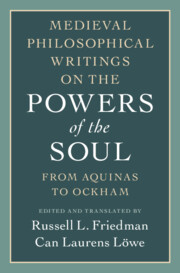Book contents
- Frontmatter
- Contents
- Acknowledgments
- Sources of the Translated Texts
- Notes on the Translations
- List of Abbreviations, Symbols, and Conventions
- Introduction:
- 1. Bonaventure (d. 1274), Commentary on the Sentences, book II, d. 24, a. 2, q. 1:
- 2. Albert the Great (d. 1280), Summa theologiae, book I, treatise 3, q. 15, chap. 2, a. 2, c. 1:
- 3. Thomas Aquinas (d. 1274), Commentary on the Sentences, book I, d. 3, q. 4, a. 2:
- 4. Henry of Ghent (d. 1293), Quodlibet III, q. 14 (excerpts):
- 5. Godfrey of Fontaines (d. ca. 1306), Quodlibet II, q. 4:
- 6. Thomas of Sutton (d. ca. 1315), Ordinary Question 4 (excerpts):
- 7. Peter of John Olivi (d. 1298), Questions on the Sentences, book II, q. 54 (excerpts):
- 8. John Duns Scotus (d. 1308), Commentary on the Sentences (Reportatio A), book II, d. 16:
- 9. James of Viterbo (d. 1308), Quodlibet I, q. 7, doubt 1:
- 10. Durand of St.-Pourçain (d. 1334), Commentary on the Sentences (Third Version), book I, d. 3, part 2, q. 2:
- 11. William Ockham (d. 1347), Commentary on the Sentences (Reportatio), book II, q. 20
- Glossary of Terms
- Glossary of Arguments
- Bibliography
- Index
9. - James of Viterbo (d. 1308), Quodlibet I, q. 7, doubt 1:
Does the Will Move of Its Own Accord?
Published online by Cambridge University Press: 10 April 2025
- Frontmatter
- Contents
- Acknowledgments
- Sources of the Translated Texts
- Notes on the Translations
- List of Abbreviations, Symbols, and Conventions
- Introduction:
- 1. Bonaventure (d. 1274), Commentary on the Sentences, book II, d. 24, a. 2, q. 1:
- 2. Albert the Great (d. 1280), Summa theologiae, book I, treatise 3, q. 15, chap. 2, a. 2, c. 1:
- 3. Thomas Aquinas (d. 1274), Commentary on the Sentences, book I, d. 3, q. 4, a. 2:
- 4. Henry of Ghent (d. 1293), Quodlibet III, q. 14 (excerpts):
- 5. Godfrey of Fontaines (d. ca. 1306), Quodlibet II, q. 4:
- 6. Thomas of Sutton (d. ca. 1315), Ordinary Question 4 (excerpts):
- 7. Peter of John Olivi (d. 1298), Questions on the Sentences, book II, q. 54 (excerpts):
- 8. John Duns Scotus (d. 1308), Commentary on the Sentences (Reportatio A), book II, d. 16:
- 9. James of Viterbo (d. 1308), Quodlibet I, q. 7, doubt 1:
- 10. Durand of St.-Pourçain (d. 1334), Commentary on the Sentences (Third Version), book I, d. 3, part 2, q. 2:
- 11. William Ockham (d. 1347), Commentary on the Sentences (Reportatio), book II, q. 20
- Glossary of Terms
- Glossary of Arguments
- Bibliography
- Index
Summary
In this text, James deals with the question of whether the will moves itself. In order to examine this question, he thinks it necessary to first develop a theory of the soul’s powers in general. At the heart of this general theory is a (then) unorthodox view about the granularity of the powers of the soul. James thinks that there are, in addition to our generic powers to think and see, a myriad of fine-grained powers in the soul, such as the power to think about cathood or the power to see red. James does not venture to say just how fine-grained these powers are, claiming that only God knows this. Drawing on terminology due to Simplicius, he calls a generic or coarse-grained power of the soul a “general aptitude” (idoneitas generalis), while he calls a fine-grained power a “special aptitude” (idoneitas specialis). James also argues in this text that an aptitude, whether general or special, is an “incomplete act”. By characterizing a power as an incomplete act, James is claiming that it is an incomplete version of the operation that it can bring about. So, for example, Socrates’ aptitude to think about cathood is an imperfect version of his act of thinking about cathood.
Keywords
- Type
- Chapter
- Information
- Medieval Philosophical Writings on the Powers of the SoulFrom Aquinas to Ockham, pp. 167 - 187Publisher: Cambridge University PressPrint publication year: 2025

